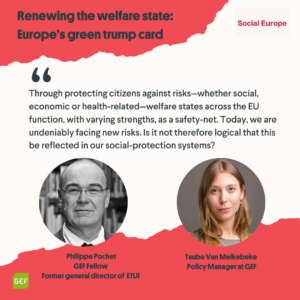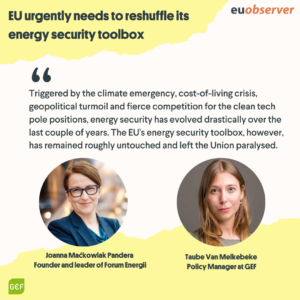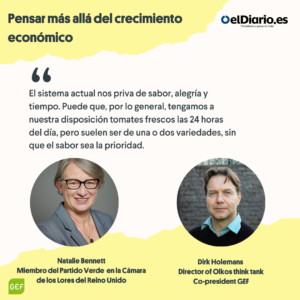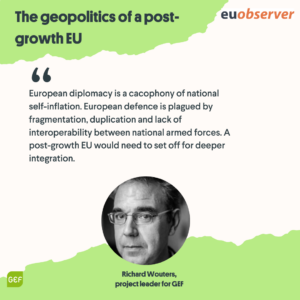
GEF strives to mainstream discussions on European policies and politics both within and beyond the Green political family. It works to create a common Green vision for Europe and to communicate it to the wider public.
Press
How can the EU single market break out of its historical straitjacket? EURONEWS

The single market, on which the EU’s economic — but also social and political — integration depends, isn’t equipped with answers to current social and environmental challenges. We must move away from price, the authors argue, and towards quality of product, quality of work and quality of life.
Renewing the welfare state, Europe’s green trump card Social Europe

A daring political offer is needed to transcend the deadlock resulting from green-bashing, farmers’ protests and simplistic dichotomies between Green Deal opponents and proponents. The welfare state, one of the single most positive political projects ever seen on European soil, can provide the positive and collective answers we need. We must now ask ourselves how welfare states can be strengthened and evolved amid the massive new challenges brought by the climate emergency. Greening its current institutions and creating a new EU layer of social protection, the authors propose, would be a good start.
EU urgently needs to reshuffle its energy security toolbox EUOBSERVER

The current Energy Security Strategy relies on fossil fuels and focuses namely on the safeguarding of gas supplies. Updating the EU’s Energy Strategy should be a priority for the next EU mandate. If done rightly, a revamped Energy Security Strategy can simultaneously strengthen the EU’s access to reliable and sustainable energy, strengthen solidarity between member states and improve the social and democratic dimension of the EU’s energy project. But how do we get there?
Energy could be the spark the EU’s democratic future needs EURONEWS

We risk an extension of the anti-EU populist fog polluting the eastern European member states. One critical channel to (re)build and maintain sustainable democracies is the European Energy Project. The EU can turn its energy project from an arena for divisive politics to a common European flagship. For this to happen, it would have to involve citizens in energy planning and decision-making and put people central to the green transition, thereby keeping the doors to social backlash closed.
A credible future beyond growth has to be feminist EUOBSERVER

The Covid-19 pandemic and Russia’s invasion of Ukraine brought extraordinary suffering but also triggered unprecedented waves of solidarity in European societies. The selfless work of volunteers combined with political decisions that contravened the profit-maximising principles of the market have saved lives and helped avert many disaster scenarios. Still, the GDP numbers failed to reflect any of this.
Pensar más allá del crecimiento económico ELDIARIO.ES
(Thinking Beyond economic growth)

Hace no mucho, fila tras fila, las estanterías de los supermercados del Reino Unido –normalmente repletas de alimentos frescos– quedaron vacías. Fue un recordatorio de las “cosas” de nuestra economía no caen del cielo. Exigen mano de obra (explotada), energía y recursos físicos, además de contaminar el planeta. Un cambio de paragima no significa un empeoramiento de nuestro nivel de vida, si exploramos cómo es realmente una vida sana y de calidad.
The geopolitics of a post-growth EU EUOBSERVER

A post-growth EU would gain in resilience. It is better to manage the end of growth through democratic deliberation than to have it imposed on us by ecological breakdown or resource conflicts. Will a post-growth EU be able to defend itself, its allies, democracy, human rights and a rules-based international order against attacks by the likes of Russia or China?
The future of Europe depends on cities THE BRUSSELS TIMES

Ambitious policies are only possible in healthy democracies that respect the rule of law and give public debate and civil society the necessary space. But in some countries, the erosion of the rule of law prevents cities from acting as frontrunners in the transition to a more sustainable society. The European Union and its European Green Deal should not therefore be seen merely as negotiation between nation-states but parts of a multilevel system that depends on a vibrant local level.
Other articles
Greens work on their narrative: pacifism is naive
Hoe een postgroei-Europa stevig in de schoenen blijft staan op het wereldtoneel
(How a post-growth Europe will stand firmly on the world stage)
Postgroei en geopolitiek. Zijn ze te combineren?
(Post-growth and geopolitics: can they be combined?)
This podcast explores the implications for Europe’s global standing if it were to shift away from economic growth as its central guiding principle. The episode welcomes sustainability expert Gaya Herrington, who contributed to GEF’s project “Geopolitics of a Post-growth Europe” and now serves as an advisor for Ukraine’s reconstruction efforts. Herrington offers insights into the potential impacts and challenges associated with this shift in economic philosophy.
The future of Tourism in the Mediterranean – Vedran Horvat
Vedran Horvat, managing director of Institute for Political Ecology and GEF´s Board Member, analyses the future of tourism in the Mediterranean in the podcast The Price of Paradise.


